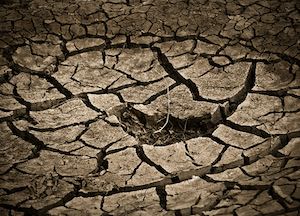What Environmental Reporting Leaves Out
Reports that scientists are “surprised" that their climate-related predictions are being surpassed suggest that chaos theory -- which says the particulars of the breakdown of the earth's ecosystems are unpredictable -- is going unread, disbelieved or ignored. Reports that scientists are “surprised" that their climate-related predictions are being surpassed suggest that chaos theory is going unread, disbelieved or ignored.
Scientists are “surprised” to find that the size of individual fish in the world’s oceans is likely to shrink by as much as one quarter in the coming decades. The use of the word suggests that chaos theory — which says the particulars of the breakdown of the earth’s ecosystems are unpredictable — is going unread, disbelieved or ignored.
Chaos theory does not lend itself to explanation in plain English. It is notoriously difficult to get across to the public. Even the highly educated can have a tough time grasping its abstract meanings and implications. In general terms, the theory holds that as an increasing number of essential parts of a complex system break down — such as a stock market, climate or mechanical engine — the overall system is destabilized, and its exact behavior becomes impossible to predict. This event precedes what’s known as “runaway,” which occurs when a critical number of those parts stop working and irreversible “tipping points” have been passed.
At this stage, the only thing that can be predicted with certainty is that the system will deteriorate with increasing acceleration. Just as water always runs downhill, the processes triggered in runaway will continue irreversibly and on their own, and no one can tell what the final results will be.
Applied to the ecosystems in the earth’s oceans, this means that scientists cannot say exactly what will happen to a particular species of seaweed or fish at most stages in the process. This is because the number of variables that bear upon that species — temperature, salt levels and the state of species nearby or across the world, for example — becomes too great to be included in any predictive model.
In other words, the relationships between parts within the system become so complex and the changes occur so rapidly that scientists cannot keep up. By the time they identify a problem and propose a solution, their work becomes obsolete, their discoveries made irrelevant. This fact can make it difficult to trust their predictions.
As a professional class, scientists are among the most reticent people in the world. They don’t want to be seen as alarmist, so most (with few exceptions) will err on the conservative side of the estimates that result from their work. This is especially true when they speak to the press, which means that environmental predictions reported in the mainstream media should almost always be viewed as idealistic and assumed in reality and over time to be much worse.
With all of this in mind, let’s turn briefly to the researchers’ exclamations about their latest predictions.
“We were surprised as we did not think the effects would be so strong and so widespread,” project leader professor William Cheung of the University of British Columbia told The Guardian.
Professor Callum Roberts of the University of York, an academic who was not among the study’s authors, offered some of the additional information that is needed to place the implications of the project’s results within a broad understanding of the earth’s ocean and climate systems. “It could be worse than that,” Roberts said, before describing the research as the most comprehensive to date. “Additional impacts of climate change such as the acidification of the ocean and reduction of nutrients in surface waters could decrease fish stocks even further,” The Guardian reports he said.
Though it hardly qualifies as news, it’s worth repeating, as Roberts points out, that 1 billion people currently count fish as their primary source of animal protein. With a global population expected to reach somewhere in the range of 9 billion by 2050, that number will assuredly rise, as will the importance of our understanding of how ecological systems deteriorate.
As these systems move into chaos, the variables impacting the health, population, size and other aspects of a fish species become too numerous to count. Predictive models can remain meaningful in the short term, but over time, the growing number of variables that play a role in determining the fate of any plant or animal becomes virtually impossible to make sense of. In their efforts to understand the unraveling, scientists can only scramble to bring their models up to date as their subjects approach levels of complexity that lie beyond the power of any human to comprehend.
None of this suggests that scientific research is meaningless. It simply shows that predictions made early in the process of growing chaos should be regarded as snapshots in time, relevant for only a short while. Scientists remain our best forecasters of what’s to come, but they can see only so far into the earth’s future. Aside from the unsettling fact that the systems that support human and other life are disintegrating at an increasing rate, no one can say for sure exactly what the world we’re rushing into will look like.
Your support matters…Independent journalism is under threat and overshadowed by heavily funded mainstream media.
You can help level the playing field. Become a member.
Your tax-deductible contribution keeps us digging beneath the headlines to give you thought-provoking, investigative reporting and analysis that unearths what's really happening- without compromise.
Give today to support our courageous, independent journalists.






You need to be a supporter to comment.
There are currently no responses to this article.
Be the first to respond.